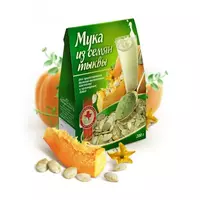Pumpkin flour

We believe that many residents of our latitudes are aware of the unique beneficial properties of a plant such as pumpkin. In addition, do not underestimate the taste and consumer characteristics of the fruit of the pumpkin plant. According to its biological structure, pumpkin or Cucurbita belongs to herbaceous plants belonging to the Pumpkin family.
On the territory of the Russian Federation, such a type of plant as common pumpkin is actively cultivated. Researchers call the territory of modern Mexico the birthplace of pumpkin, where people began to cultivate the plant about 3, 000 years BC. It is worth noting that pumpkin was eaten, and the ancient Egyptians also used the seeds of the plant in folk medicine.
Pumpkin flour composition
Currently, pumpkin flour, which is obtained during the processing of pumpkin seeds, has begun to be especially popular and in demand. Pumpkin flour is distinguished by its truly unique vitamin-mineral composition, which went to the product from nature. The chemical composition of pumpkin flour contains a significant amount of vegetable protein, which in turn is perfectly absorbed by the human body, and also contains a number of essential amino acids.
Pumpkin flour contains arginine, a natural compound that helps strengthen the body's immunity, as well as avoid diseases such as obesity, hypertension, fatty liver dystrophy, diabetes mellitus and others. The benefits of pumpkin flour for the human body are invaluable and are due to the vitamin-mineral composition of the product, which contains such important compounds as lysine, isoleucine, glycine, glutamine, as well as phenylalanine and cucurbitin.
Pumpkin flour benefits
The benefit of pumpkin flour also lies in the content in the chemical composition of the product of vitamins of group A, B, C, K, PP, as well as F. Pumpkin seed flour contains more than 50 different biologically active components in its composition. The leading place among the minerals included in pumpkin flour is occupied by zinc, phosphorus and calcium.
Pumpkin seed flour contains a really record number of different biologically active components that have a beneficial effect on the entire human body as a whole. The benefits of pumpkin flour lie not only in the vitamin-mineral composition of the product, but also in the distinctive properties. Pumpkin flour has a bactericidal, androgenic, anti-inflammatory, as well as antitumor anti-allergic effect on humans.
Doctors and nutritionists recommend introducing pumpkin seed flour into the diet of people who suffer from diseases of the liver, skin, as well as helminthiasis, cardiovascular diseases, as well as ailments associated with the excretory and sexual system of the human body. Specialists actively use the useful properties of pumpkin flour in the treatment of atherosclerosis, strokes and heart attacks, as well as angina, diabetes mellitus and anemia.
Pumpkin flour brings maximum benefit to people whose work is associated with heavy physical as well as constant mental exertion. Pumpkin seed flour is used for baking as well as other culinary products. In addition, pumpkin flour can be mixed with water and eaten as a protein cocktail.
pumpkin flour 305 kCal
Energy value of pumpkin flour (Ratio of proteins, fats, carbohydrates - ju):
Proteins: 33 g (132 kCal ~)
Fats: 9 g. (~ 81 kCal)
Carbohydrates: 23g (~ 92kCal)
Energy ratio (bj | y): 43% | 27% | 30%
 Español
Español Français
Français Português
Português Русский
Русский 简体中文
简体中文 繁體中文
繁體中文 日本語
日本語 한국어
한국어 العربية
العربية Türkçe
Türkçe Қазақ
Қазақ Deutsch
Deutsch Italiano
Italiano Українська
Українська
